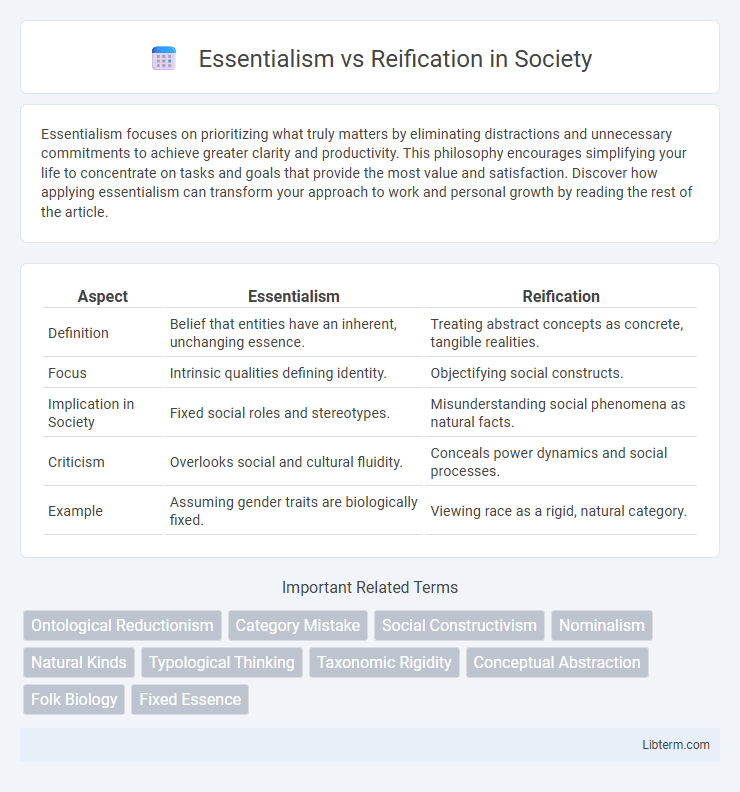Essentialism focuses on prioritizing what truly matters by eliminating distractions and unnecessary commitments to achieve greater clarity and productivity. This philosophy encourages simplifying your life to concentrate on tasks and goals that provide the most value and satisfaction. Discover how applying essentialism can transform your approach to work and personal growth by reading the rest of the article.
Table of Comparison
| Aspect | Essentialism | Reification |
|---|---|---|
| Definition | Belief that entities have an inherent, unchanging essence. | Treating abstract concepts as concrete, tangible realities. |
| Focus | Intrinsic qualities defining identity. | Objectifying social constructs. |
| Implication in Society | Fixed social roles and stereotypes. | Misunderstanding social phenomena as natural facts. |
| Criticism | Overlooks social and cultural fluidity. | Conceals power dynamics and social processes. |
| Example | Assuming gender traits are biologically fixed. | Viewing race as a rigid, natural category. |
Introduction to Essentialism and Reification
Essentialism posits that objects and concepts possess inherent, unchanging essences defining their true nature, emphasizing intrinsic characteristics over external attributes. Reification involves treating abstract concepts or social constructs as concrete, tangible entities, leading to the mistaken belief that these constructs have an independent, objective existence. Understanding essentialism and reification is crucial in fields like philosophy, sociology, and linguistics for analyzing how we categorize and interpret reality.
Defining Essentialism: Core Concepts
Essentialism defines entities by their inherent traits considered necessary and unchanging, emphasizing the existence of an underlying essence that determines identity and function. This philosophical approach categorizes objects or concepts based on intrinsic properties rather than external attributes or social constructs. Essentialism contrasts with reification, which treats abstract ideas as concrete entities, by maintaining a focus on fundamental, essential characteristics that define reality.
Understanding Reification: Key Principles
Reification involves treating abstract concepts or social constructs as if they were concrete, tangible entities, leading to oversimplified perceptions of complex phenomena. Key principles of reification include the objectification of dynamic processes and the misconception that social realities exist independently of human interaction. Understanding reification is crucial for critically analyzing how ideas like culture, identity, and institutions are represented and fixed in rigid, immutable terms.
Historical Roots of Both Philosophies
Essentialism originated in ancient Greek philosophy, notably with Plato, who argued for the existence of immutable essences underlying observable phenomena. Reification emerged prominently in Marxist theory during the 19th century, critiquing the process by which social relations are perceived as things or natural entities. Both philosophies evolved through distinct historical contexts: Essentialism rooted in metaphysical inquiries, Reification developed as a critique of capitalist society and alienation.
Essentialism in Philosophy and Social Science
Essentialism in philosophy and social science posits that entities possess inherent, immutable characteristics defining their identity and behavior across contexts. This perspective influences debates on identity, categorization, and social roles by emphasizing fixed essences over situational or socially constructed factors. Critics argue that essentialism overlooks cultural, historical, and individual variability, thus impacting interpretations of social phenomena and human nature.
Reification: From Marxism to Modern Theory
Reification, originating from Marxist theory, refers to the process by which social relations are perceived as characteristics of things rather than human interaction, leading to objectification and alienation in capitalist societies. Modern theory expands reification beyond economic contexts to critique how abstract systems, such as technology and bureaucracy, mask human agency and reinforce structural power dynamics. Contemporary scholars utilize reification to analyze cultural phenomena, emphasizing the entrenchment of commodified identities and institutional frameworks shaping social reality.
Comparative Analysis: Essentialism vs Reification
Essentialism posits that entities possess inherent, immutable characteristics defining their identity, emphasizing intrinsic qualities as the core of understanding. Reification, in contrast, treats abstract concepts or social constructs as concrete, tangible realities, often leading to the misconception that these abstractions are natural or unchangeable. This comparative analysis highlights essentialism's focus on fixed essence versus reification's process of objectifying and solidifying fluid ideas into perceived realities.
Implications in Identity and Social Constructs
Essentialism attributes fixed, inherent characteristics to social groups, reinforcing stereotypes and limiting individual diversity within identities. Reification treats abstract social constructs as concrete realities, solidifying power dynamics and social hierarchies by obscuring their fluid and constructed nature. These perspectives influence policies, social cohesion, and personal identity formation by either rigidly defining or misunderstanding the mutable facets of group membership and social roles.
Critiques and Controversies Surrounding Both Views
Essentialism faces critique for its rigid categorization that oversimplifies complex identities, often ignoring social and cultural variability. Reification is controversial as it risks treating abstract concepts as concrete, potentially obscuring contextual nuances and reinforcing stereotypes. Both views are debated for their impact on social theory, with essentialism criticized for promoting determinism and reification for limiting critical analysis.
Conclusion: Navigating Between Essentialism and Reification
Navigating between essentialism and reification requires balancing the recognition of inherent qualities with the risk of oversimplifying complex phenomena. Emphasizing context and fluidity helps avoid rigid classifications while maintaining meaningful distinctions. This approach fosters critical thinking and nuanced understanding in both academic and real-world applications.
Essentialism Infographic

 libterm.com
libterm.com